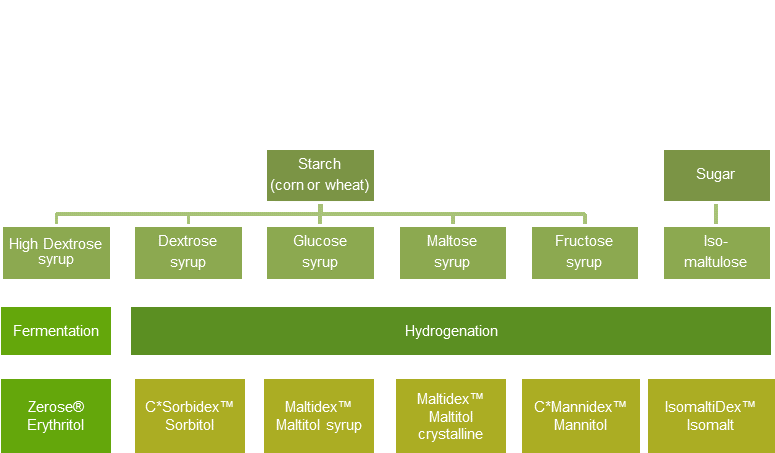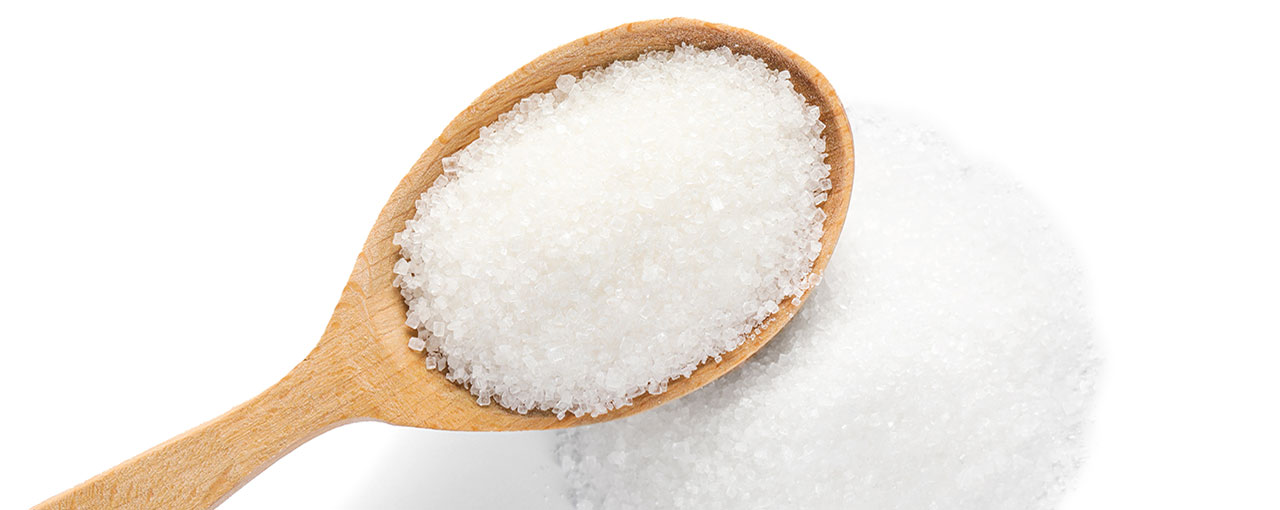Low/No Calorie Sweeteners
As reducing sugar consumption has become a global concern, consumers are actively seeking out foods and beverages with less sugar – but few are willing to give up the satisfaction of sweetness.
Polyols – also known as sugar alcohols (although they are not a sugar, nor an alcohol) – can be an excellent solution. These versatile sweeteners offer the potential for great-tasting reduced-sugar and sugar-free products, while contributing important sensory and functional benefits.
Benefits
- Ideal for reducing sugar and calories: Polyols are metabolised in a different way than carbohydrates like sugar, glucose and starch. Since they are only partially metabolized and absorbed, the caloric value is lower than that of other sugars.(2.4 Kcal/g vs 4.0 Kcal/g). They have a reduced glycemic index
- Sugar-like: Polyols help to bring back lost texture and mouthfeelin reducedsugar products. They could be used in combination with high-intensity sweeteners as their clean sugar-like taste helps to mask off-flavors.
- Support oral health: Polyols are non-cariogenic and so do not contribute to caries or tooth decay.
- Excellent processing stability: Withstanding severe acid and heat conditions during processing.
Most polyols occur naturally in a variety of food products like vegetables, fruits and mushrooms. They are also regularly present in fermented foods like wine or soy sauces. Polyols are therefore a normal constituent of the human diet.
Product offer
Discover our full product offer
| C*Sorbidex® Sorbitol (Relative sweetness: 40-50) | |||
|---|---|---|---|
| Powder | Syrup | ||
|
|
||
| C*Mannidex® Mannitol | |||
| Powder | |||
|
|||
| IsoMaltidex® Isomalt | IsoMaltidex® Isomalt – Maltitol blend | ||
| Powder & Syrup | Syrup | ||
|
|
||
| Maltidex® Maltitol (Relative sweetness: 80-90) | |||
| Powder | Syrup | ||
|
|
||
| Zerose® Erythritol (Relative sweetness: 60-70) | |||
| Powder | |||
|
|||
Zerose® erythritol
Applications
Production Process
Although most polyols are present in nature, e.g., in fruits and vegetables, their extraction is not a viable production method.
- Polyols (or polyhydric alcohols) are obtained by the hydrogenation of sugars, derived from corn or wheat starch (maltitol, mannitol, sorbitol) or cane or beet (isomalt).
- Erythritol is the first polyol to be industrially manufactured by a fermentation process.
-
Polyols can be available in powder form (via crystallization), and some are also available in liquid (isomalt, maltitol, sorbitol) form.

EU Labelling
Regulation (EC) No 1333/2008 on food additives and amendments regulates the use of food additives which are used
- to impart a sweet taste to foodstuffs
- as tabletop sweeteners.
Its annex II contains a list of foodstuffs in which polyols can be used, at quantum satis level. The use is, in most cases, restricted to foodstuffs which are either "energy-reduced" or manufactured "with no added sugars".
Definitions (for the purpose of this Regulation)
- "with no added sugars": without any added mono- or di-saccharides or any added foodstuff containing mono- or di-saccharides which is used for its sweetening properties
- "energy-reduced": with an energy value reduced by at least 30 % compared with the original foodstuff or a similar product
Labelling – Regulation (EU) N° 1169/2011 on the provision of food information to consumers
- Foodstuffs containing any polyols must carry a label "with sweetener(s)"
- Foodstuffs containing both an added sugar or sugars and any polyols must carry a label "with sugar(s) and sweetener(s)"
- Foodstuffs containing more than 10 % added polyols must carry a label "excessive consumption may produce laxative effects"
All Cargill’s polyols also comply with Commission Regulation (EU) N°231/2012 and amendments laying down specifications for food additives listed in Annexes II and III to Regulation (EC) N° 1333/2008 for use in foodstuffs.
Sustainability
We source certified corn and wheat, benchmarked at Silver level according to Farm Sustainability Assessment*. This industry-recognized benchmark system supports good agricultural practices in key sustainability areas, including:
![]()

